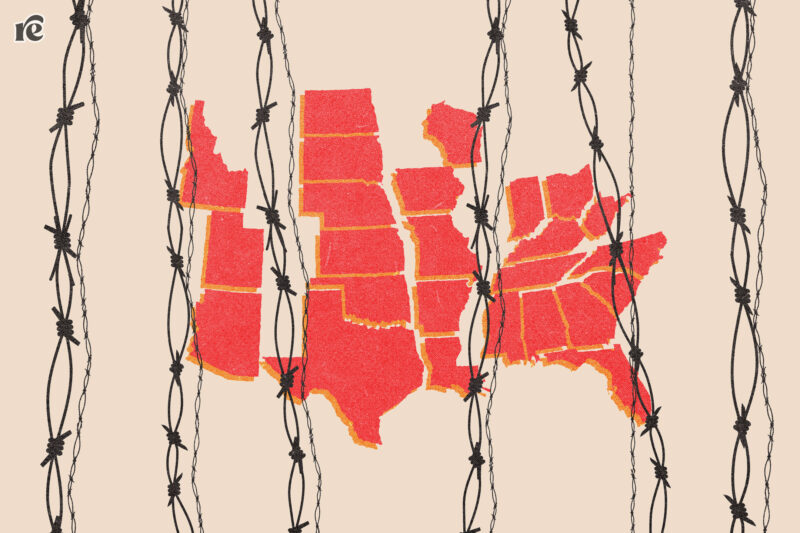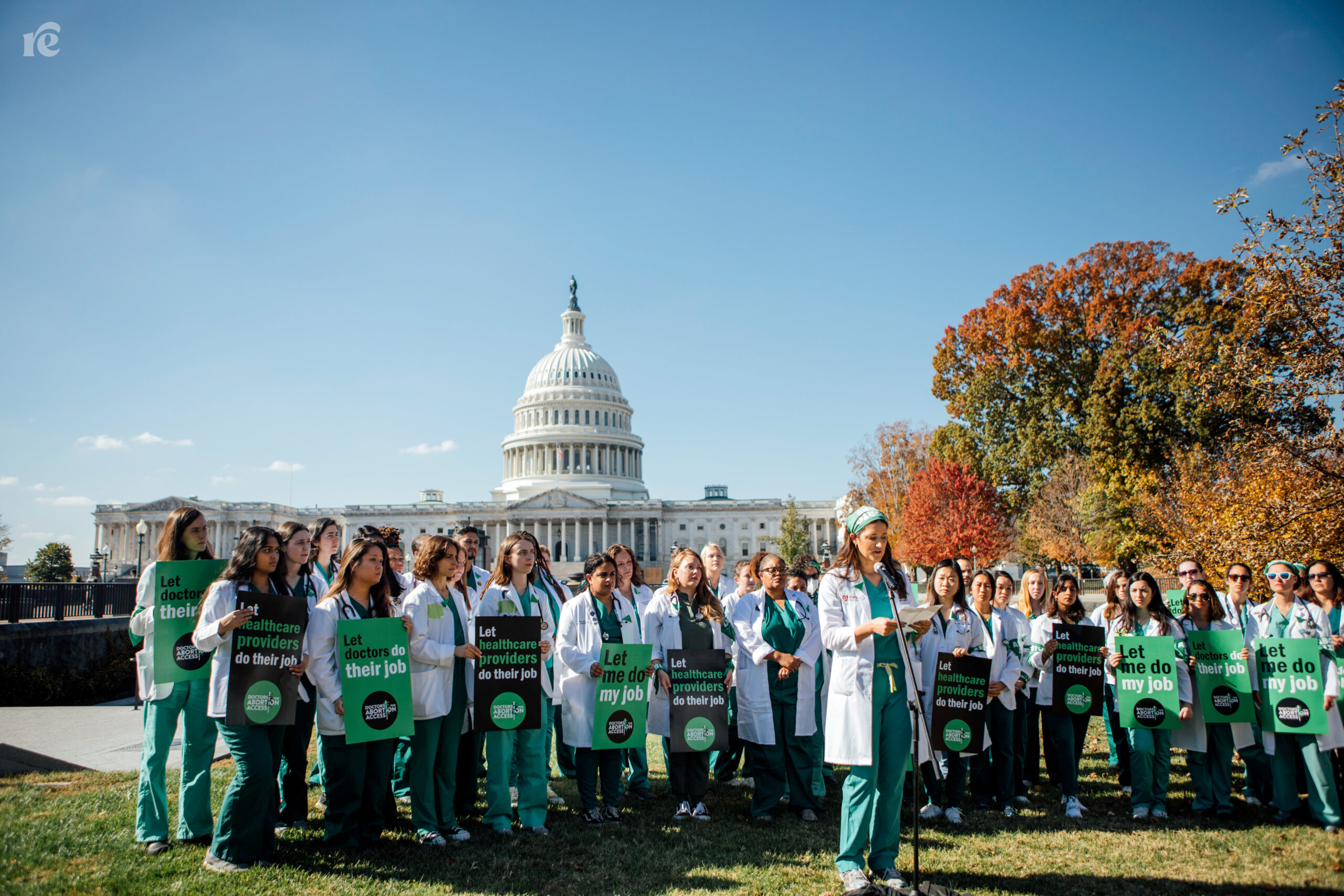Abortion Bans Are Creating OB-GYN Residency Deserts Across the Country
Medical residents are facing an impossible choice: serve the communities that matter to them, or get the full scope of training available?

This story is part of our back to school issue. Check out the rest of our Campus Dispatch stories here.
Before Emily was an OB-GYN medical resident in Tennessee, and back when she was a teenager, she hated abortion. Emily grew up in a small, conservative town near Louisville, Kentucky, where it was cool to be Catholic and everyone she knew attended a Wednesday night religion class. It was there that the adult teachers first exposed Emily to the concept of abortion.
“The only encounter that I’d had with abortion was someone showing me very graphic videos that I’m not even certain of now were actual abortions, and being like, ‘Look, isn’t that so scary?’” Emily, who requested to use a pseudonym to protect her anonymity, said.
She stopped identifying as Catholic in college, where, by the time she was 21, she realized her stance on abortion.
“It just clicked,” she said. “I was like, ‘I am actually not anti-choice at all. I’m very supportive of other people’s choice.”
Her medical specialty clicked for her, too, when she did her OB-GYN rotation in her third year of medical school.
“We did a C-section, and I was like, ‘That was metal. That was really cool,’” Emily said. “Then I learned more about abortion care and was like, ‘Whoa, I actually love this and feel like I could be really good at this.’”
Emily is in her third year of OB-GYN residency—the required training to become a practicing physician—in Chattanooga, Tennessee, where abortion is completely banned. It has been two years since the Supreme Court overturned Roe v. Wade, which means two cycles of medical school graduates applying to residency programs have gone by. Since Dobbs v. Jackson Women’s Health Organization was decided, residency programs in states where abortion is banned or restricted have received fewer applicants. According to research by the Association of American Colleges’ (AAMC’s) Research and Action Institute, this trend has continued for the second year in a row.
While the 2023–2024 application cycle had 72 fewer resident applicants than the previous year, states with complete abortion bans suffered the largest decrease in applicants. Programs located where abortion remains legal experienced a 0.6 percent decrease in applicants, but residency programs in abortion ban states experienced a 4.2 percent decrease—seven times greater than in states with no abortion restrictions.
Fourteen states have total abortion bans. In Tennessee, a trigger law sent a ban into effect soon after the Dobbs decision and has remained in place ever since. Other states have gestational limits that restrict how far into a pregnancy a person can get an abortion. Five states have gestational limits of six to 12 weeks, where abortion is illegal six weeks after a person’s last menstrual period, before most people know they’re pregnant. Six states have gestational limits ranging from 15 to 22 weeks. According to the World Health Organization, gestational limits may force people to seek illegal, unsafe abortions; attempt to induce abortions on their own; or travel for abortion access in places where abortion is legal.
The research paid close attention to medical students applying for residency program specialties most likely to be affected by abortion bans, including OB-GYN, pediatrics, emergency medicine, family medicine, and internal medicine. Despite OB-GYN experiencing a small increase in total overall applicants, states with complete abortion bans saw a 6.7 percent decrease in OB-GYN applicants in 2023–2024 from the previous application cycle. States with no restrictions saw a 0.4 percent increase in OB-GYN applicants. (Overall, the number of OB-GYN applicants increased by 0.6 percent.)
“While almost all residency positions are filled due to a shortage of training positions, states with reproductive health-care restrictions may have a harder time attracting candidates of choice.”
– Kendal Orgera, lead research analyst for the AAMC Research and Action Institute
This does not mean residency positions go unfilled in states with abortion restrictions, but many of these residents choose to leave and practice medicine elsewhere, according to Kendal Orgera, lead research analyst for the AAMC Research and Action Institute and co-author of the analysis.
“While almost all residency positions are filled due to a shortage of training positions, states with reproductive health-care restrictions may have a harder time attracting candidates of choice,” Orgera told Rewire News Group. “Because about half of trainees stay to practice in that state, this may have long-term implications for the ability to serve patients across communities in some states.”
Dobbs has exacerbated the issue of health-care or maternity-care deserts in parts of the United States, which means people must travel far distances, sometimes outside of their home states, for various kinds of OB-GYN services—not just abortions.
“The most obvious type of care you have to leave the state to get is abortion care,” said Dr. Nikki Zite, professor and vice chair of the University of Tennessee’s Graduate School of Medicine OB-GYN department. “But if there’s not an OB-GYN in your county because OB-GYNs either are retiring and you can’t replace them or people are leaving because they’re afraid of being criminalized, then there’s not even somewhere to go for contraceptive care or other OB-GYN care.”
The reality of being an OB-GYN resident in an abortion-restrictive state

Residents have little control over where they will complete their training. Medical school graduates apply and interview at multiple programs with their desired specialty and then undergo the placement process known as The Match. Once an applicant signs up for The Match, they enter a contract that binds them to wherever an algorithm matches them. Applicants rank the programs they interviewed at, and the programs rank the applicants. On Match Day, applicants open envelopes that reveal where the algorithm has placed them on their next yearslong journey of medical training. Residents may be matched to programs they did not want but are training for their desired specialty. Such was the case for Emily.
She had hoped the matching algorithm would place her in a Ryan Program, a residency training program with specific certifications in abortion and contraception care. Emily applied to all Ryan programs, but OB-GYN is a competitive specialty. To widen her chances of matching, she applied to one non-Ryan program in Chattanooga.
“I had preferences and matched at my last ranked program, the only non-Ryan program that I interviewed at,” Emily said. “I was obviously devastated by that, because I really thought I would match at one of my top programs.”
Still, Emily was thankful to match at a specialty she loved and determined to make the best of her residency.
Hospital staffs are hierarchical, with the lowest-ranking residents who have been there the least time doing grunt work and reporting to their attending physicians. Residents have a lot of responsibility, despite little say over patient care and little respect from other staff. Most residents also have crushing debt from student loans, leaving them stuck on the path of medicine to pay it off.
“You’re really vulnerable because you’re pretty much an indentured servant. You get paid very little money on the hour,” Emily said. “I love being a doctor, but being a resident is really freaking hard and kind of miserable. You’re really at the mercy of your program attendings, the administrators, and what they think is right.”
Taking initiative to get the training they need

As residents train to become doctors, they do not want their residency limited by abortion restrictions.
“Many want to train at programs where they can train on the full scope of health care, including abortion access,” Zite said.
OB-GYN residents in restrictive states are forced to leave the state to fulfill the graduation requirements set by the Accreditation Council for Graduate Medical Education (ACME). ACME requires OB-GYN residents to have access to a residency program with abortion care, and the resident’s institution must support them in their endeavor. For residents like Emily, that meant going out of state—away from Chattanooga, where the last abortion clinic closed more than 30 years ago—to learn the full scope of reproductive care.
“I wanted to be an all-star,” she said. “I wanted to be a varsity-level abortion provider, and I was never going to get that in Chattanooga.”
After the Dobbs ruling in June 2022, Emily began reaching out to programs around the country for a visiting resident rotation. She contacted more than 30 institutions, clinics, and individuals and either received no response or was told they could not accommodate a visiting resident. Finally, in May 2023, she had a lucky break. Oregon Health and Science University in Portland created a visiting resident rotation after the Dobbs decision, to which she applied and was accepted. But Emily’s battle to receive the abortion training essential to her career did not end there.
Emily said that a month before she was set to leave, the Graduate Medical Education (GME) office in Tennessee notified her program director they would not pay her salary while she was in Portland. She was going there to provide abortion care—something the GME office said it could not spend federal money on. Without getting paid, Emily could not keep up with her loans, and she was running into problems figuring out state insurance.
“The logistics of getting there were so hard,” Emily said. On top of the day-to-day stresses of residency, she was forced to work out how she would get to Portland and pay her bills. Luckily, she received a $1,000 grant from Planned Parenthood, and Oregon Health and Science University paid the rest of her salary.
Despite the long road to Portland, Emily’s time there proved something crucial.
“It confirmed that I can do this advanced gestational age abortion care, and I think I’m the right person for it,” she said.
Emily said her residency program in Chattanooga is more conservative than she thought it would be, and she has worked with outwardly anti-choice people. She said she walks a fine line between doing what she thinks is right for patients and not getting on attending physicians’ bad sides.
“I’m not part of so many of these conversations where patients may or may not be getting abortion counseling that they deserve,” Emily said. “So many people in the abortion world work in Oregon and California and Chicago, and it’s like abortion Disneyland.
They can do whatever they want, and they are well supported by their community and their other faculty members.”
Zite said clinicians can experience moral distress in the face of abortion restrictions.
“The more we learn in medicine, the more we want to be able to take care of situations that we encounter with our patients,” she said. “We can tell a patient that their pregnancy is impacted by a fetus that has no brain or no skull, but we can’t offer them termination of that pregnancy in Tennessee.”
Emily plans on leaving Chattanooga to practice medicine and looks forward to being able to provide the care she wants, but she said it’s important to not let stereotypes about Southern people being “just a bunch of rednecks who don’t know any better” justify abortion restrictions.
“These communities are full of very kind people who deserve the same level of care that is available to them as people in Oregon, New York, and California,” Emily said.
As Emily approaches her final year of residency, she plans to provide all the care she can as an OB-GYN resident in a place where abortion is banned.
“These areas are so deserving of passionate providers who actually care and are knowledgeable of their culture and community,” Emily said. “They’re deserving of providers who are educated on that and feel strongly about helping them in the same way they do people in more liberal communities.”
